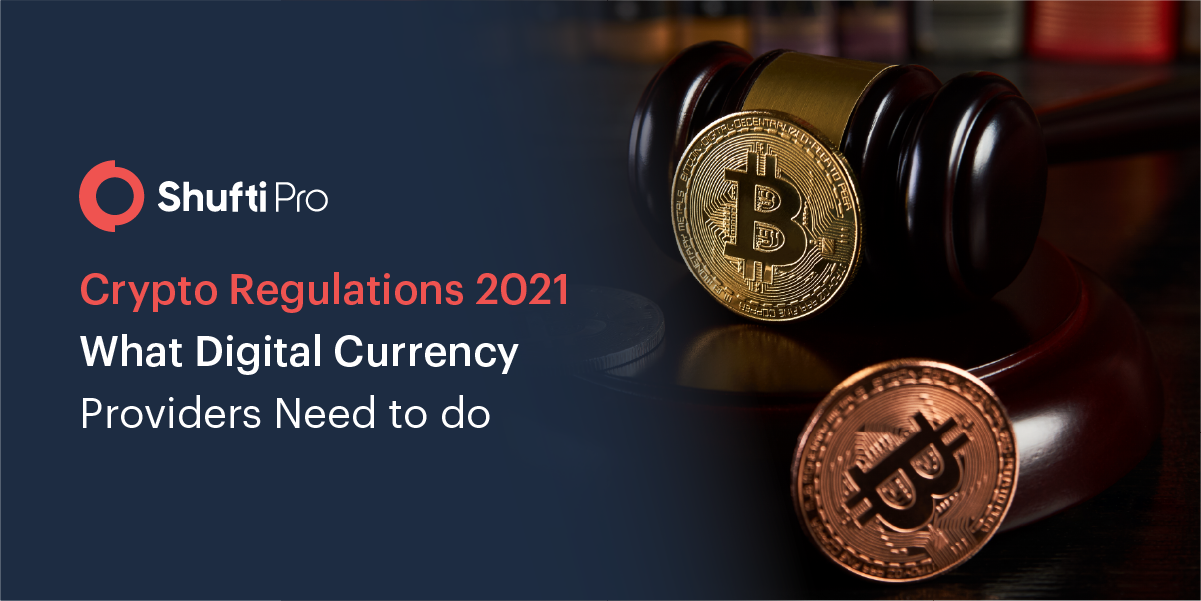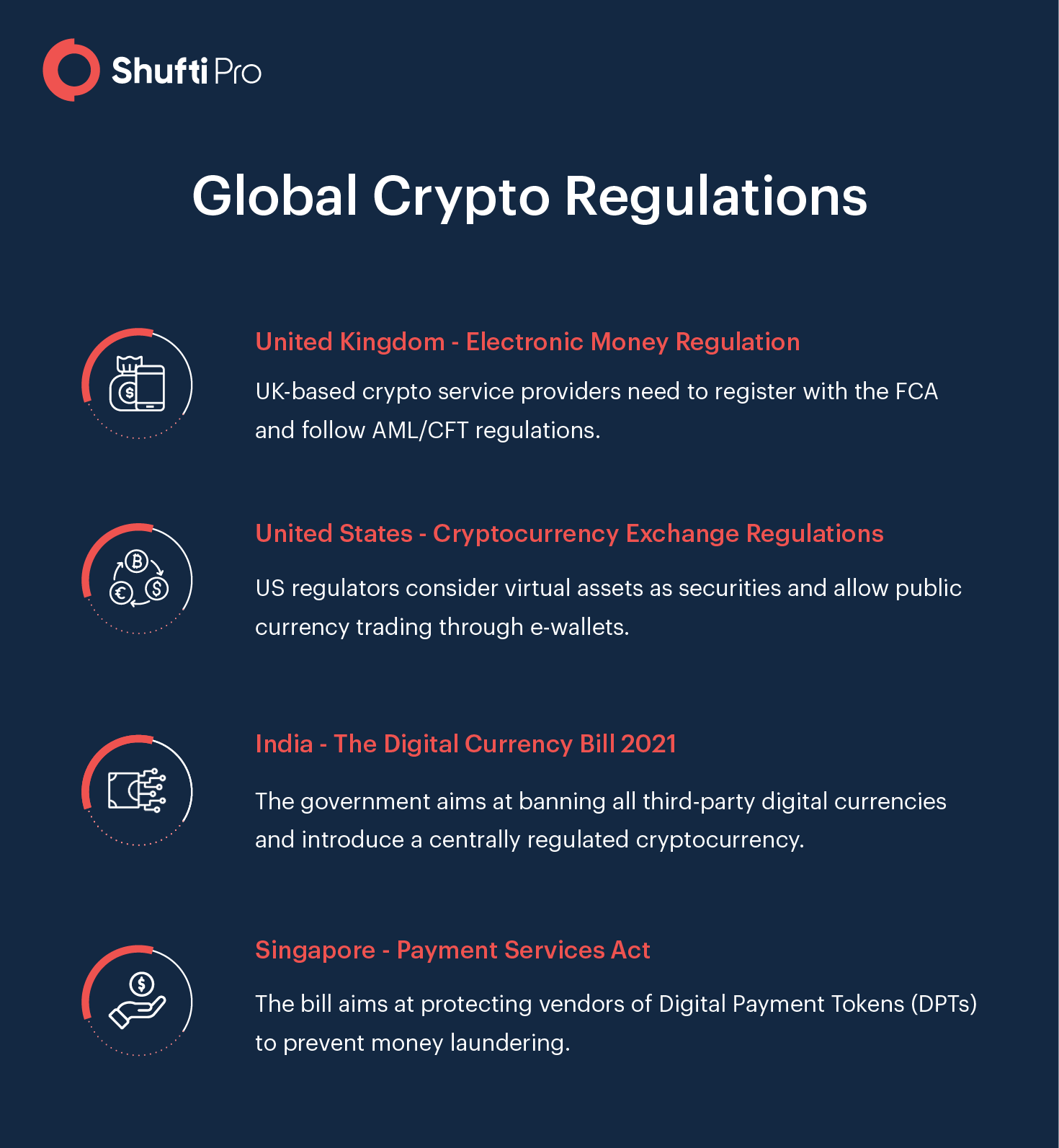Crypto Regulations 2021 – What Digital Currency Providers Need to do

Cryptocurrency has been a hot topic ever since its advent in 2009. The ability to draw investor appetite makes the virtual currencies market highly volatile. Since they are not regulated by a central banking system, these assets are not considered legal tender in any jurisdiction around the world. Crypto transfers come with a fair amount of anonymity that allows fraudsters to conduct money laundering and other cybercrime.
To combat fraudulent activities through virtual currency exchange, different countries have introduced regulations to prevent the illicit flow of money. Global authorities have come to a mutual agreement that despite the hidden nature of transactional information, crypto transfers need to be centralized as well. The blog covers regulations and efforts to prevent virtual asset services from being misused and how digital currency providers can comply with them in 2021.
Why Cryptocurrency Needs Regulations?
Even though regulations can affect crypto trading values, proper measures can stabilize the market in the long run. This creates better opportunities for safer investments that will draw more financers into the market. Moreover, regulatory authorities would be able to take down false identities dealing in black money exchanges.
Crypto Regulations Around the World
United Kingdom
Traders in the UK are allowed to buy and sell cryptocurrencies. Virtual Asset Service Providers (VASPs) in the UK can provide cryptocurrency services after registering with the Financial Conduct Authority (FCA). The scenario is different if they have applied for an e-money licence that allows storing the client’s funds for an extended period. Apart from this, digital currency providers are also required to comply with Customer Due Diligence and AML checks as per the laws.
Cryptoassets Taskforce
The Bank of England with HM Treasury has established the “Cryptoassets Taskforce” that regulates currencies issued by VASPs. It aims at making the UK a better place to conduct safe and transparent financial activities. While ensuring regulatory measures, it protects consumers of virtual currency exchanges to assist investors to grow better.
What does the FCA require?
The FCA has banned all crypto derivatives which are secondary means of obtaining valued assets. To mitigate cybercrime through virtual currency platforms, the FCA has established an AML/CFT supervisor for crypto business. According to the PS 19/22 guidance issued on cryptoassets, the below-listed entities are subjected to comply with crypto regulations:
- P2P exchange platforms
- Virtual Asset Service Providers
- Vendors that issue new coins
- Firms providing open-source software for coins and protocols
AML compliance obligations in the UK demand KYC and CDD checks for customers of crypto-exclusive businesses. The details include the full name, an identity document with a photo ID and proof of their residence. The UK regulations also encourage VASPs to keep a financial record of beneficiaries and carry out Enhanced Due Diligence and PEP Screening of high-risk crypto users.

United States
Similar to other countries, cryptocurrency in the US is not considered a legal tender by federal or state laws. The Internal Revenue Service (IRS) defines crypto assets as property and has issued relevant tax policies for their transfer. Securities and Exchange Commission, the US regulatory body, has applied security laws on digital wallets exchanges while the Commodities Futures Trading Commission (CFTC) defines crypto assets as a commodity that allows using virtual currency derivatives publicly.
Efforts made by FinCEN
The Financial Crimes Enforcement Network of the US Treasury has proposed a regulation to bridge AML regulatory gaps in digital asset transactions. The rule requires financial entities such as banks, fintech firms and credit unions to perform identity verification of crypto users using “unhosted wallets”. These wallets not supported by a financial institution are often used by bad actors and are hard for law enforcement authorities to take down. The US crypto regulation covers the following essential requirements for virtual currency exchange platforms:
- Banks and FinTechs should report customer information to FinCEN on crypto transactions done through more than $10,000 within 15 days
- Financial businesses will practice AML compliance standards for virtual currency transfers between $3000 to $10,000 as per the Bank Secrecy Act (BSA)
- Information on unhosted wallets includes the type and time of the crypto transactions, their value in US Dollars, payment instructions submitted by the customer, and the name and address of the transacting parties.
China
To provide investor protection and to prevent financial risks, China has taken certain measures to regulate cryptocurrencies. Initial Coin Offering (ICO) is declared illegal as per the Chinese government due to the inherent risks to the country’s economy and financial sector. The circulation of virtual tokens with the absence of proper authorization is considered illegal. The ICO rule issued by the government warns of financial crimes including pyramid selling, false fundraising schemes, and illegal token issuance.
China’s ICO Rule extends to platforms used for cryptocurrency trading that restricts them from converting legal tender into digital assets. Third-party crypto vendors are not allowed to carry out the sale and purchase of cryptocurrencies, set their price, or provide related services in China.
Central Bank Virtual Currency
The People’s Bank of China (PBOC) has been developing digital Yuan to address crypto-related risks. This will allow regulatory bodies to better identify customers using the digital currency since it is issued by a central authority. According to the Chinese government, the virtual currency would be backed by the PBOC ultimately preventing financial crime through digital asset exchanges.
How can Shufti’s IDV Solution help?
To address anonymity and financial crime related to cryptocurrency, identity verification of customers is essential. Verifying the identity of crypto users allows businesses to practice Know Your Customer (KYC) standards while meeting AML obligations by global regulators. Acquiring identity information from customers helps maintain transparency and trust to establish a good business relationship.
Identity Verification by Shufti allows cryptocurrency service providers to identify and verify their users in real-time. Our AML/KYC solution powered with artificial intelligence allows digital currency providers to comply with international standards of different countries. Shufti’s IDV solution provides an accuracy of more than 98% for an effortless verification of customer identity allowing regulatory compliance.

 Explore Now
Explore Now













